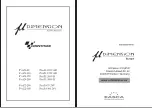
43
US
A
d
di
ti
on
al
I
n
fo
rm
at
io
n
Check the connection of the HDMI cable, optical digital cable, or
audio cable that is connected to the system and the TV (refer to
the supplied Startup Guide).
Increase the volume on the TV or cancel muting.
When a TV compatible with Audio Return Channel (ARC)
technology is connected with an HDMI cable, make sure the cable
is connected to the HDMI input (ARC) terminal of the TV (refer to
the supplied Startup Guide).
If the TV is not compatible with Audio Return Channel (ARC)
technology, connect the optical digital cable in addition to the
HDMI cable in order to output sound (refer to the supplied Startup
Guide).
Set [Control for HDMI] to [On], and then set [Audio Return Channel]
to [Auto] (page 25).
The sound is output from both the system and the TV.
Turn off the sound of the system or the TV.
The TV sound from this system lags behind the image.
Set [A/V SYNC] to [0ms] if it is set to the range between [25ms] and
[300ms] (page 29).
No sound or only very low-level sound of the device connected to
the system is heard.
Press
+ on the remote control and check the volume level
Press
or
+ on the remote control to cancel the muting
function (page 48).
Make sure the input source is selected correctly. You should try
other input sources by pressing INPUT on the remote control
several times (page 7).
Check that all the cables and cords of the system and the
connected device are firmly inserted.
No sound or only very low-level sound is heard from the
subwoofer.
Press SW
+ on the remote control to increase the subwoofer
Make sure that the on/standby indicator on the subwoofer is lit in
green. If not, refer to “No sound is heard from the subwoofer.” in
“Wireless sound” (page 45).
The subwoofer is for reproducing bass sound. In the case of input
sources that contain very little bass sound components (i.e., a TV
broadcast), the sound from the subwoofer may be difficult to
hear.
When you play content compatible with copyright protection
technology (HDCP), it is not output from the subwoofer.
The surround effect cannot be obtained.
Depending on the input signal and the sound field setting,
surround sound processing may not work effectively. The
surround effect may be subtle, depending on the program or disc.
To play multi-channel audio, check the digital audio output
setting on the device connected to the system. For details, refer to
the operating instructions supplied with the connected device.
USB device
The USB device is not recognized.
Try the following:
Turn the system off.
Remove and reconnect the USB device.
Turn the system on.
Make sure that the USB device is securely connected to the
(USB) port (page 8).
Check to see if the USB device or a cable is damaged.
Make sure that the USB device is on.
If the USB device is connected via a USB hub, disconnect it and
connect the USB device directly to the system.
BLUETOOTH
BLUETOOTH connection cannot be completed.
Make sure that the indicator (blue) of the Bar Speaker is lit
(page 11).
System status
Indicator (blue) status
During BLUETOOTH pairing
Flashes quickly
The system is attempting to connect
with a BLUETOOTH device
Flashes
continued
Summary of Contents for HT-ST9
Page 186: ...64ES ...
Page 187: ......
















































